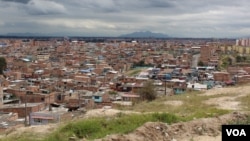Eight years ago, the government of Colombia and the Revolutionary Armed Forces of Colombia, or FARC, signed a peace accord that ended a 52-year-long conflict that killed more than 220,0000 people and displaced millions more.
Today, despite significant progress, challenges remain, according to the United Nations. The country faces two major problems. The first is regional conflict. The second is an illicit economy, or “wars of greed,” according to the United Nations. Colombia’s president, Gustavo Petro, said recently that his country “was unable to solve its problem of violence because it failed to include all its territories in the nation-building process as one democratic state.”
“The United States has strongly supported the [peace] Accord since its signing,” said U.S. Permanent Representative to the United Nations, Linda Thomas-Greenfield.
“[J]ust as this conflict played out over years, so too will alleviating its consequences — including current challenges to security, stability, and counternarcotics. To get there, efforts toward full implementation of the peace agreement including justice for victims and survivors must be accelerated.”
Ambassador Thomas-Greenfield also told the U.N. Security Council recently that the United States commends the Special Jurisdiction for Peace — a transitional justice mechanism created as part of the peace agreement — for its “vital work supporting victims and survivors of the conflict.” In addition, she stressed that the United States welcomes “progress towards rural reform, a comprehensive and challenging but vital component of the 2016 Peace Accord.”
“To advance the Comprehensive Rural Reform chapter and to create more equitable, sustainable, and peaceful communities across Colombia, more must be done to expand land rights, climate-smart agriculture, and access to financing,” she said. “That especially goes for women and marginalized racial, ethnic, and Indigenous communities.”
Ambassador Thomas-Greenfield noted that strengthening Colombian and U.S. efforts to prevent forced recruitment of children by armed groups is a good example of the holistic effort needed to end the violence.
“[W]e need to stop treating young people as simply drivers of conflict or victims needing protection and instead empower them as leaders and co-equal partners in developing constructive solutions,” she said,
“Past peace processes have shown that a security strategy is essential to pressure illegal armed groups to negotiate in good faith,” said Ambassador Thomas-Greenfield. “[W]e will continue to track discussions between the Colombian government and the FARC-EP ... [I]t is essential that parties abide by their commitments and ensure respect for human rights and international humanitarian law.”














